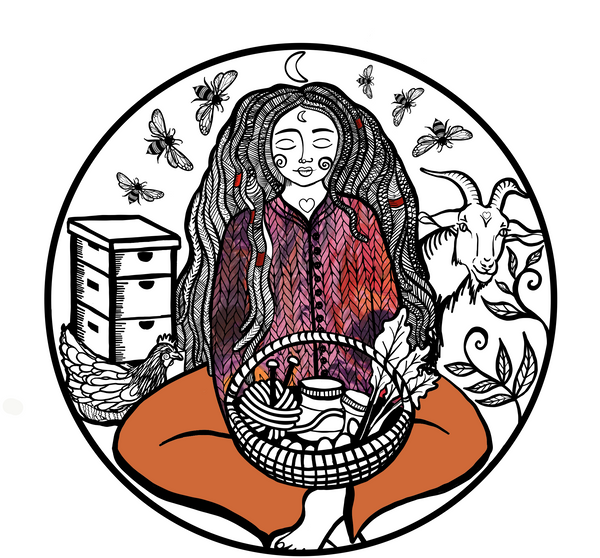Lemon balm holds a special place in my heart bieng one of the first medicinal herbs I learnt about and grew. I am often found raving about lemon balm and its amazing benefits. I use it in Tea and tinctures using drop doses to tackle episodes stress and anxiety. You might be curious about the best way to consume it for medicinal purposes—tincture or tea? Well, both methods work wonders when it comes to reaping the benefits of this zesty herb. Let's dive in and explore!
The Marvels of Lemon Balm
Feeling stressed or anxious? Lemon balm is here to save the day! This fantastic herb helps reduce stress and anxiety, leaving you with a sense of calm that's as refreshing as a cool breeze on a summer day.
Got a upset tummy when you're feeling anxious? Lemon balm is your new best friend. It's particularly great for soothing upset stomachs, relieving gas, and banishing bloating. Say goodbye to those uncomfortable bellies!
Having trouble getting to sleep? Lemon balm is a sleep superhero. It's often included in sleep blends for its calming effect, helping you drift off into dreamland faster than you can say "goodnight."
Tincture or Tea: The Battle of the Balm
Now, let's settle the score between tincture and tea. Both methods are equally effective, so it ultimately comes down to personal preference.
If you're a fan of convenience and quick results, go for the tincture. Just a few drops under your tongue, and you'll be feeling lemony-fresh in no time. Plus, it's a great conversation starter when your friends ask what mysterious elixir you're taking.
On the other hand, if you enjoy a cozy ritual and sipping on warm goodness, opt for the tea this can be particularly easy if you have Lemon balm growing in the garden as it is typically available all year around ( If you don't grow it our range of our teas include lemon balm and we also have dried lemon balm available ).
Brew a cup of lemon balm tea, inhale the delightful aroma, and let the soothing liquid work its magic. It's like a hug in a mug!
Whether you choose the tincture or the tea, lemon balm will be your trusty companion on the journey to stress relief, digestion bliss, and a good night's sleep. So go ahead, embrace the zesty wonders of this quirky herb!
Let's Get Brewing!
Alright, now that you're all excited about this magical tea, let's get down to business. Here's how you can make a perfect cup of lemon balm tea:
Step 1: Gather Your Ingredients
First things first, gather all your ingredients. For one cup of lemon balm tea, you'll need:
- 2 teaspoons of fresh chopped lemon balm leaves (or 1 teaspoon dried)
- 1 cup of just boiled water
Step 2: Infuse the Herb
Now that you have your ingredients ready, it's time to work some magic. Place the chopped lemon balm leaves in a cup and pour the freshly boiled water over them. Cover the cup with a small plate or an infuser lid to capture those precious volatile oils escaping with the steam.
Step 3: Let it Brew
Patience, my friend, is the key here. Let the lemon balm leaves steep in the hot water for about 10 minutes. This will allow all the flavors and goodness to infuse into the tea. Take a deep breath and enjoy the tantalizing aroma that fills the air.
Step 4: Strain and Sip
Once the tea has brewed to perfection, it's time to strain out the leaves. Grab a fine-mesh strainer or a tea infuser and strain the tea into your favorite cup. Take a moment to appreciate the vibrant green color and the heavenly scent.
Step 5: Savor the Flavor
Finally, the moment you've been waiting for. Take a sip of your homemade lemon balm tea and let the flavors dance on your taste buds. Feel the warmth spreading through your body, melting away any stress or worries. Ah, pure bliss!
Drink Up and Enjoy!
You can enjoy this delightful lemon balm infusion up to 3-4 cups per day. Sip on it in the morning to kickstart your day, or indulge in a cup before bedtime to unwind and relax. The choice is yours!
So, my friend, go ahead and give this easy-peasy lemon balm tea recipe a try. Trust me, once you've experienced the joy of sipping on this aromatic elixir, there's no going back. Cheers to good health and happy sipping!
But what about Tinctures? Our Method below
This is a folk method is commonly used by the home herbalist as it is less particular in its ratios and alcohol content. While certain constituents in some plants need higher alcohol than what can be easily purchased from the liquor store, home herbalists have had great success using alcohol of around 40% for making their tinctures the only time we find we need a higher percentage alcohol is when making Propolis tincture as the resin needs 95% Alcohol to break it down.
Lemon Balm Tincture
In a clean jar ¾ fill with fresh lemon balm leaves (if using dried lemon balm ½ fill the jar)
Fill the jar with 40% - 45% vodka
Put a tight-fitting lid on the jar.
Put it in a cool dark spot, but in a place that will be easy to access each day. Thanks
Shake daily
After 4 weeks strain through a fine mesh sieve or muslin, squeezing out as much liquid as you can.
Pour the strained tincture into your dropper bottles and label them with the name of the herb, date made, and alcohol content in this case, it will be 45%

